Advisory firm FSG’s new CEO helps philanthropists stay the course on DEI
John Harper is stepping into his role as CEO of nonprofit advisory firm FSG with plans that include making the firm more responsive to philanthropy leaders' evolving needs and supporting their efforts to maintain DEI programs.
It’s been just over a month since John Harper took over as CEO of the influential global consulting firm FSG, but he already has plans to make the firm more supportive of diversity, equity, and inclusion programs in philanthropy at a time when they’re under threat. Harper was announced as FSG’s new CEO late last year and officially stepped into the role on Jan. 2. He has been at the firm since 2019, most recently as managing director of its United States consulting division. He has the benefit of already being an insider. Yet the 38-year-old said he’s still settling into the idea of being a CEO. “It’s my first go-round. So, I’m feeling all the first-time CEO vibes,” he recently told Devex. “I’m super excited for all the things on the horizon,” he said. “I think there’s a unique value that we can add to the field.” The Boston-based firm consults with nonprofits, corporations, and foundations, with the goal of creating equitable systems change. Its roster of clients includes major corporations such as Goldman Sachs and Microsoft, as well as nonprofits and philanthropies, including the Conrad N. Hilton Foundation, the Ford Foundation, and the Mastercard Foundation. The firm has more than 100 employees spread across offices in the United States and Asia. Its work in Asia and Africa is based out of Mumbai, India. The firm is a leader in equity issues, including economic and racial equity. And as its new chief, Harper will be steering FSG during an especially precarious time for such work, particularly DEI efforts in corporate and private philanthropy. A lawsuit filed last year against an Atlanta-based venture capital firm and its foundation that provided grants to Black women entrepreneurs has had a chilling effect on U.S.-based foundations and other organizations with race-based grant programs — and a court ruling could affect their funding to programs abroad. Different approaches So far, most FSG clients with DEI programs aren’t making significant changes to those programs or strategies, Harper said. However, he has noticed differences in how organizations are proceeding with the work. Some leaders are doubling down on their DEI commitments, he said. Others — especially within the corporate world and among smaller family foundations who often are in a more “challenging political context” — are moving away from calling a lot of attention to their work through statements or public announcements, he said. Among those choosing to work more quietly in the DEI space, there has been a shift away from using language such as social justice or Black, Indigenous, and people of color, or BIPOC, Harper noted. They are replacing that language with terms such as underserved or underestimated. These differing approaches to addressing DEI have created divisions in the philanthropy world. There are some who argue that if you’re not using the “right language” to describe what you’re doing, then nothing else matters, he explained. Harper, who describes himself as a pragmatist, said he sees the benefits of both approaches. He uses examples of prominent figures in African-American history to illustrate his point. There will always be people like American civil rights icon Martin Luther King Jr., who advocated for nonviolent resistance to systemic oppression while also pushing for policy changes, Harper said. Others will be more like the strident Malcolm X, who, while serving as national spokesperson for the Black Muslim organization known as the Nation of Islam, advocated for self-defense “by any means necessary.” Malcolm X later softened his position after leaving the Nation of Islam in 1964. Harper said his own thinking aligns most closely with the writer, feminist, and civil rights activist Audre Lorde whose philosophy falls somewhere between the two men. Her approach “would say you need some of that flexibility in the different ways you approach a movement in order to actually see long-term change,” he said. It’s admirable that some organizations aren’t making any changes to their DEI language, but even those that are adopting new proxy words can still have the intended impact of creating more equity, he said. Focus on equity Like this reporter, Harper attended Oberlin College. Unlike this reporter, he also was accepted to Oberlin’s famous conservatory where he studied vocal performance. He graduated with both a Bachelor of Music and a Bachelor of Arts in African-American Studies. Harper transitioned to nonprofit work fairly quickly after leaving Oberlin, which is located near Cleveland, Ohio. Shortly after graduating, he became manager of Ohio Boychoir, a musical education nonprofit that was shuttered in 2009. Promoting equity has also been at the center of his career. He has written about some of the tools foundations can use to advance racial equity. Harper and FSG colleagues also have helped lead the work of the Corporate Racial Equity Alliance — a multiyear effort co-founded by FSG, California-based research institute PolicyLink, and JUST Capital, a research nonprofit that examines the relationship between the public and U.S. corporations. The alliance created a blueprint for how corporate CEOs can promote racial and economic equity, among other things. Additionally, Harper worked with the Cleveland Foundation, one of the oldest and largest community foundations in the U.S., to reshape the organization’s strategy after the global racial reckoning of 2020 after the murder of George Floyd. The goal of the project was to help the foundation better address the local history of segregation, demographic and economic shifts, and community disinvestment in the greater Cleveland area, Harper wrote in a blog post. “His unique approach inspires people to see their own potential to create impact and transformative change which is essential as the need to create social change becomes more urgent and the challenges more complex,” Mark Kramer, FSG board member and co-founder, said in a statement. FSG is advising clients to have a firm understanding of the legal boundaries that would apply to their DEI work if race-based grantmaking was deemed unlawful and to develop clear metrics and goals for what they plan to achieve through these programs. Following the global racial reckoning of 2020, many commitments were made, but “there wasn’t an explicit target of what we were trying to achieve,” he said. “What we are saying to folks is there is an opportunity to build that clarity into your program,” Harper said. The ‘humble learner mindset’ Like many other nonprofit consulting firms, FSG publishes research and other materials offering guidance and recommendations for philanthropy work. The research also helps clients identify causes in need of attention and funding, such as poverty alleviation or climate change. Harper plans to continue that work, but he doesn’t think FSG should always lead the discussions. Often the thinking is that consultants have to bring their clients the answers, Harper said. They post research on their website and then “leave it for folks to do the work from there.” But there is value in encouraging more of an ongoing conversation with practitioners in the field to gain insight about what is or is not working and what challenges still exist, he said. For FSG, that may look like creating more opportunities for consultants to learn from nonprofit leaders, as well as for those leaders to learn from each other through the firm’s learning communities and other initiatives, he said. Harper is naturally inclined to focus on the teacher-student relationship. His mother was a teacher. And he started his own career at education-focused nonprofits such as Uncommon Schools and The Center for Whole-Child Education, both based in the United States. Those experiences helped shape his leadership style, he said. “As I step in as CEO, I’m bringing forward this humble learner mindset. I want FSG to focus not only on the rigor of our analysis and depth of our insights, but also the experiences, environment, and relationships that people need for meaningful change,” he wrote in a public letter published last month. “I want us to build on our incredible legacy of 20+ years of advancing social change by listening deeply to our clients, our partners, and the communities we seek to serve as we co-create what comes next,” he said.
It’s been just over a month since John Harper took over as CEO of the influential global consulting firm FSG, but he already has plans to make the firm more supportive of diversity, equity, and inclusion programs in philanthropy at a time when they’re under threat.
Harper was announced as FSG’s new CEO late last year and officially stepped into the role on Jan. 2. He has been at the firm since 2019, most recently as managing director of its United States consulting division.
He has the benefit of already being an insider. Yet the 38-year-old said he’s still settling into the idea of being a CEO.
This story is forDevex Promembers
Unlock this story now with a 15-day free trial of Devex Pro.
With a Devex Pro subscription you'll get access to deeper analysis and exclusive insights from our reporters and analysts.
Start my free trialRequest a group subscription Printing articles to share with others is a breach of our terms and conditions and copyright policy. Please use the sharing options on the left side of the article. Devex Pro members may share up to 10 articles per month using the Pro share tool ( ).
Stephanie Beasley is a Senior Reporter at Devex, where she covers global philanthropy with a focus on regulations and policy. She is an alumna of the UC Berkeley Graduate School of Journalism and Oberlin College and has a background in Latin American studies. She previously covered transportation security at POLITICO.








